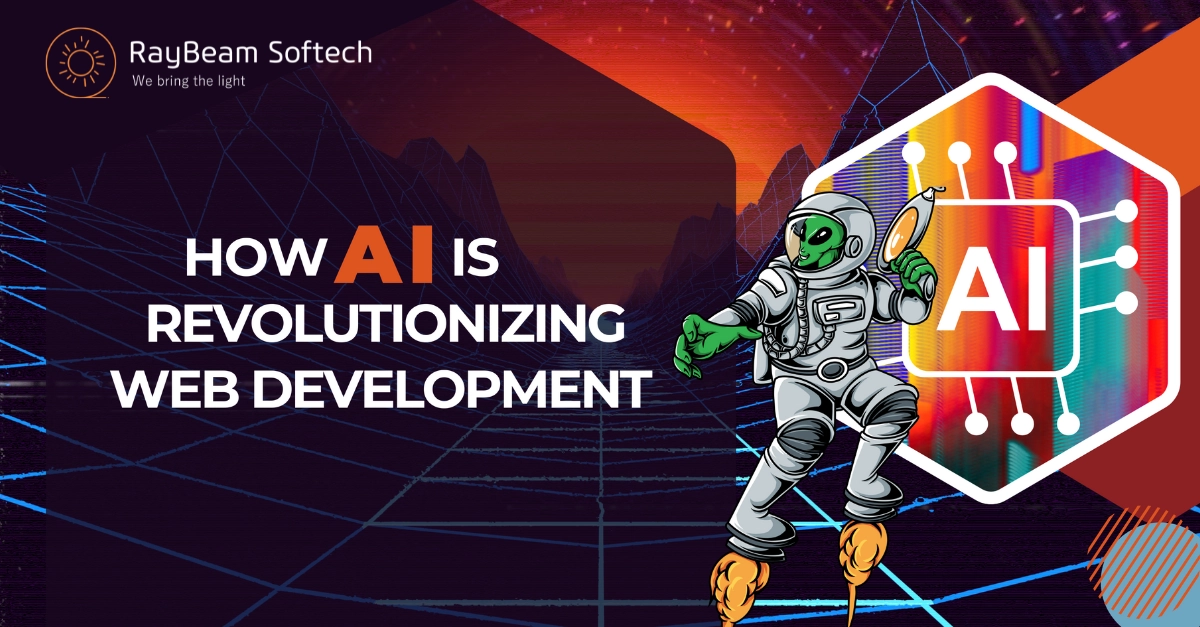Raybeam Softech | June 5, 2025

In today's rapidly changing digital world, web development is evolving faster than ever. At the heart of this transformation lies Artificial Intelligence (AI). But how exactly is AI revolutionizing web development? This comprehensive guide will explore AI's role in reshaping website creation, optimization, maintenance, and the overall digital experience. Whether you're a developer, business owner, or tech enthusiast, this guide will provide actionable insights into the future of web development powered by AI.
AI in web development involves using machine learning algorithms, natural language processing, data analysis, and automation tools to improve how websites are built, managed, and optimized. With AI, developers and businesses can:
AI doesn't replace human creativity but augments it, allowing for more efficient, accurate, and scalable web development processes.
AI-powered code assistants like GitHub Copilot and TeleportHQ allow developers to write code much faster. These tools suggest functions, complete code snippets, and even structure entire sections of code based on project context. This reduces time spent on routine tasks and allows developers to focus on complex problem-solving.
AI-based design platforms such as Uizard and Adobe Sensei assist in creating responsive layouts, automatically suggesting design elements, color schemes, and layouts that optimize user experience (UX) and user interface (UI) design. Non-technical users can also create visually appealing websites with minimal coding knowledge.
AI writing tools like ChatGPT, Jasper, and Copy.ai generate high-quality content for blogs, product descriptions, and FAQs. These tools can also suggest SEO-optimized keywords, meta tags, and structured data, improving search engine rankings and website visibility.
AI-powered platforms such as DeepCode and Snyk continuously analyze codebases, detecting bugs, vulnerabilities, and syntax errors instantly. This ensures higher code quality, faster deployment, and reduced technical debt.
AI algorithms analyze user behavior and preferences to deliver tailored content, product recommendations, and customized website layouts. This hyper-personalization leads to higher user engagement, longer session times, and improved conversion rates.
As voice assistants like Alexa, Siri, and Google Assistant become more prevalent, optimizing websites for voice search is crucial. AI-driven natural language processing (NLP) ensures that websites understand and respond to voice queries effectively, enhancing accessibility and discoverability.
AI-based security tools monitor website activity, detect anomalies, and respond to threats in real-time. Solutions like Darktrace and CrowdStrike provide proactive protection against malware, phishing, and hacking attempts, safeguarding sensitive user data.
Businesses adopting AI in web development experience numerous benefits:
Automating coding, design, testing, and content creation cuts development time by up to 50%.
Reduced labor costs as AI handles repetitive tasks.
Personalized interactions, faster load times, and intuitive navigation.
Real-time analytics and predictive insights help optimize business strategies.
AI tools analyze keyword trends, competitor data, and search algorithms to improve search engine rankings.
Continuous monitoring and instant response to threats ensure safer websites.
Major e-commerce platforms like Amazon use AI algorithms to analyze user browsing and purchase history, providing highly accurate product recommendations that boost sales and customer satisfaction.
AI-powered SEO tools such as SurferSEO, MarketMuse, and SEMRush evaluate keyword trends, optimize content, and analyze competitor strategies, helping businesses dominate search engine results.
With the rise of smart speakers and mobile voice assistants, AI-driven natural language processing ensures that websites are optimized for conversational search queries, capturing a growing segment of voice-driven web traffic.
AI chatbots like Intercom and Drift provide 24/7 customer support, answering queries, processing orders, and resolving issues instantly, improving customer experience and reducing support costs.
AI analyzes historical data to forecast user behavior, allowing businesses to make proactive decisions about inventory management, marketing strategies, and website updates.
As voice assistants like Alexa, Siri, and Google Assistant become more prevalent, optimizing websites for voice search is crucial. AI-driven natural language processing (NLP) ensures that websites understand and respond to voice queries effectively, enhancing accessibility and discoverability.
AI-based security tools monitor website activity, detect anomalies, and respond to threats in real-time. Solutions like Darktrace and CrowdStrike provide proactive protection against malware, phishing, and hacking attempts, safeguarding sensitive user data.
AI-assisted code generation
Content generation, customer support chatbots
Real-time code analysis and debugging
AI-powered design and UX optimization
Front-end code automation
Deliver tailored content and recommendations to users
As AI continues to evolve, the future of web development holds even greater promise:
Websites will adapt content, layout, and design in real-time based on individual user behavior, preferences, and previous interactions, creating unique experiences for each visitor.
With more than 50% of searches expected to be voice-based by 2025, websites will need conversational content, structured data, and AI-powered voice optimization to remain competitive.
AI will automatically adjust colors, fonts, button placements, and navigation structures based on real-time user interactions, continuously optimizing for user satisfaction and conversion rates.
AI will run thousands of A/B tests simultaneously, analyzing which variations perform best and automatically promoting the highest-converting designs and content.
AI will power interactive AR experiences on websites, enabling virtual product trials, immersive training modules, and enhanced e-commerce experiences.
Many fear that AI might replace web developers, but the reality is more collaborative. AI excels at automating repetitive tasks, but human developers bring creativity, critical thinking, and ethical considerations that machines can't replicate.
AI serves as a powerful assistant, enhancing developer capabilities rather than replacing them. Developers who embrace AI tools will become even more valuable in the evolving job market.
The simple answer is: No. AI enhances web development but does not eliminate the need for human expertise.
AI handles the heavy lifting, while humans provide direction and strategy.
AI is not just a passing trend—it is fundamentally transforming how websites are built, optimized, and maintained. By embracing AI, businesses and developers can create faster, smarter, more secure, and highly personalized web experiences. The most successful professionals will be those who learn how to harness AI's full potential while bringing their unique human creativity and strategic thinking to the table.
As we move further into 2025 and beyond, AI and web development will continue to evolve together—partners in building the next generation of the internet.